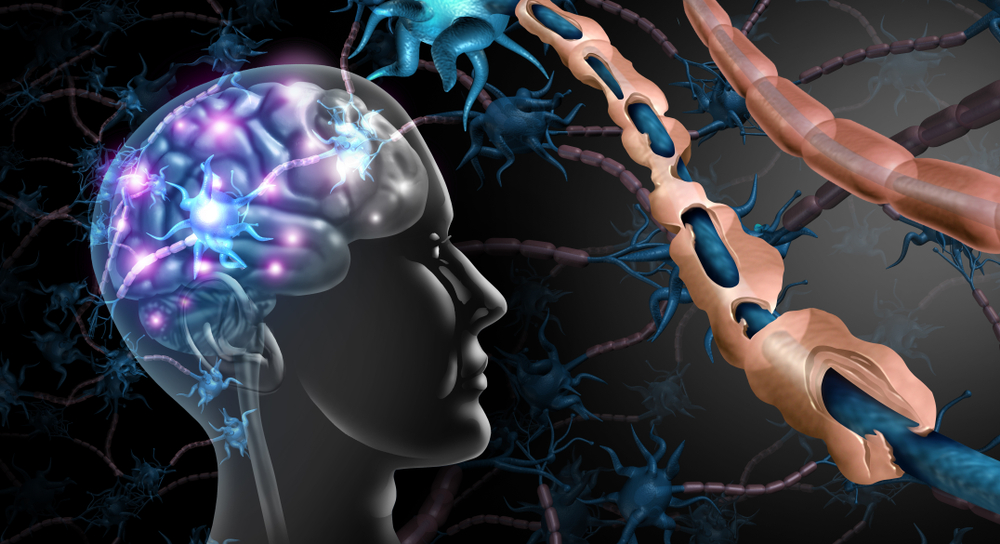Multiple Sclerosis (MS) is a chronic autoimmune disease that affects the central nervous system, including the brain, spinal cord, and optic nerves. It is estimated that more than 2.3 million people worldwide have been diagnosed with MS. In the United States, the prevalence of MS is higher in the northern states, including Colorado. Here in Denver, Axon Integrative Health is dedicated to helping people with MS live a more fulfilling life.
MS occurs when the immune system attacks the myelin sheath, which is the protective covering around nerve fibers, causing inflammation and damage. This damage disrupts the flow of information within the brain and between the brain and the rest of the body, resulting in a wide range of symptoms that can vary greatly from person to person. Some common symptoms of MS include fatigue, vision problems, muscle weakness and spasms, difficulty walking, numbness or tingling in the limbs, and cognitive impairment.
What causes MS?
While the exact cause of MS is unknown, researchers believe that a combination of genetic and environmental factors may play a role. There is currently no cure for MS, but there are a variety of treatments available that can help manage symptoms, slow disease progression, and improve quality of life. Currently there is alot of correlating evidence to suggest that gingivitis, streptococcal, and other viral loads may be the initial instigator of the disease.
What can you do at home for MS?
Many patients with MS have been in and out of multiple practitioners offices, exhausting medical funds, and spending a lot of precious time not with their families. While there are great techniques and therapies that are offered by practitioners, personal trainers, and mental health coaches. There are numerous activities and lifestyle changes that you can incorporate at home in order to spend less time, and money, to reach goals you could have reached around your family.
- Begin to practice the Wahls Protocol for Nutrition, if you have not already heard of Dr. Wahls, her story, and her curated MS nutrition plan, there is much more on the internet than I can provide here. Short story- She started noticing her MS symptoms and began her in-clinics journey, to soon find the traditional model didn’t work fully. She curated a specific diet jam-packed with health foods, cellular modulators, and free from excess inflammation that allowed her to halt her symptomatic progressions and even reverse some of them! Take the time to explore this diet and incorporate it the best you can. You must be consistent for at least 3-5months in order to see results.
- Get some exercise in the sunshine with some friends. Movement coordination, increases in heart rate, being in nature, and surrounding yourself with community has been shown in numerous studies to improve general well-being and health, along with fighting off neurodegenerative and cognitive diseases.
Nutrition and Exercise are hands down the most effective self-administered therapies that anyone with MS, or any health concern can partake it with no extra charge. Start slow, consistency is the biggest factor, build into a strict plan.
What can we do for MS?
At Axon Integrative Health, we offer a comprehensive approach to MS treatment that includes a combination of conventional and complementary therapies. Our team of providers work closely with each patient to develop a personalized treatment plan based on their individual needs and goals.
We offer a range of complementary and alternative therapies that can help improve overall health and well-being. These may include acupuncture, chiropractic care, NeuroRehab, nutritional/ Functional Medicine counseling, and mindfulness practices such as meditation and breathwork. These therapies can help reduce stress, improve immune function, enhance muscular function, drive brain body control, and promote overall physical and emotional health.
Along side these complementary therapies we offer cutting-edge IV infusions and peptide therapy to help support the metabolic fuel pathways of the immune, muscular, and psychological networks. IV infusions such as Glutathione provide immense increases in cellular health through increasing immune function, decreasing reactive oxygen species, and enhancing cellular remodeling in the neuronal axons and motor end-plates. Peptide therapy is a new form of therapy that targets various peptides (smaller than a protein, bigger than an amino acid) within different tissues, networks, and pathways. Some of the biggest name peptides in MS rehab are
- BPC-157 or Body Protective Compund is a peptide released in our gastric juice to help aid from deconstruction of our stomach lining. Researchers have found that isolating this peptide and administering it at specific sites or intranassaly has increased the level of tissue healing (muscle, tendon, ligament, bone, nerve) dramatically. This can be applied to MS patients that are constantly or intermittently suffering from tissue damage. (our blog post about BPC-157 specifically can be found here).
- ISP or Intercellular Sigma Peptide, is a recently found peptide that has allowed the inhibition of inhibitory proteins found in scar tissue. These inhibitory proteins prohibit the usage of damage tissue remodeling, thus scar tissue being non usable and non transformable. ISP changes that, it allows that scar tissue to regain the ability to remodel and potentially increase the function. This is extremely promising in mice models of MS and Spinal Cord Injuries that have shown reversals in CNS plaquing and scarring. We are currently working with Patinet 0 of ISP human trials and will be able to provide more details in the future.
At Axon Integrative Health, we believe that a comprehensive approach to MS treatment is the key to achieving the best possible outcomes. By combining conventional and complementary therapies, we can help patients manage their symptoms, improve their quality of life, and achieve their goals. If you or a loved one has been diagnosed with MS, we encourage you to reach out to our team to learn more about our approach to care.
Multiple Sclerosis is a chronic autoimmune disease that affects the central nervous system. It occurs when the immune system attacks the myelin sheath, the protective covering around nerve fibers, causing inflammation and damage.
The symptoms of MS can vary greatly from person to person but commonly include fatigue, vision problems, muscle weakness and spasms, difficulty walking, numbness or tingling in the limbs, and cognitive impairment.
The exact cause of MS is unknown, but researchers believe that a combination of genetic and environmental factors may play a role.
Diagnosing MS involves a combination of tests, including a physical exam, MRI imaging, and possibly a spinal tap to analyze cerebrospinal fluid.
There is currently no cure for MS, but there are a variety of treatments available that can help manage symptoms, slow disease progression, and improve quality of life.
Treatment for MS may include disease-modifying medications, symptom management medications, physical and occupational therapy, and complementary therapies such as acupuncture, massage therapy, and nutritional counseling.
There is no known way to prevent MS, but some lifestyle factors such as maintaining a healthy diet, getting regular exercise, and managing stress may help reduce the risk of developing MS or lessen the severity of symptoms.
MS can significantly impact daily life, including work, relationships, and physical activities. However, with proper treatment and management, many people with MS are able to lead fulfilling and productive lives.
While MS is not typically considered a fatal disease, complications from the disease or associated conditions may lead to premature death.
Yes, many people with MS are able to have children, although they may need to work closely with their healthcare providers to manage their symptoms and treatment during pregnancy.




